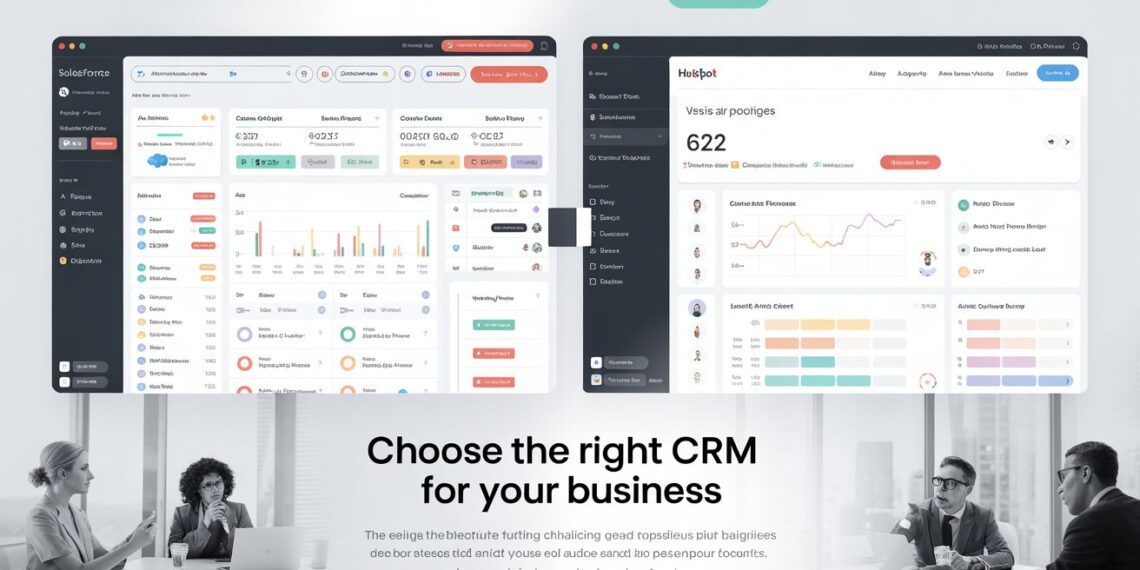Customer Relationship Management (CRM) platforms have become an essential part of modern business strategy. They help organizations manage interactions with customers, streamline sales processes, enhance marketing campaigns, and improve customer service. Among the leading CRM solutions in the market today, Salesforce and HubSpot stand out as two of the most popular and widely adopted platforms. Both tools offer powerful features but cater to different types of businesses and use cases.
In this comprehensive guide, we will conduct a CRM Tools Comparison: Salesforce vs. HubSpot, highlighting their strengths, weaknesses, pricing models, implementation considerations, and ideal use cases. By the end of this article, you will have a clear understanding of which CRM platform is best suited for your business needs today and in the future.
At a Glance: Salesforce vs. HubSpot
Feature |
Salesforce |
HubSpot |
|---|---|---|
Target Market |
Mid-size to large enterprises |
Startups, SMEs, growing businesses |
Pricing |
Complex, tier-based with add-ons |
Transparent, freemium + tiered pricing |
Core Strength |
Customization and scalability |
Ease of use and marketing automation |
Integrations |
4,000+ apps on AppExchange |
1,000+ integrations, strong native tools |
Implementation |
Time-intensive, requires experts |
Faster, user-friendly setup |
AI Capabilities |
Einstein AI (advanced analytics, automation) |
Predictive lead scoring, AI assistants |
Pricing Comparison
Pricing is one of the most significant factors for businesses when choosing a CRM. Both Salesforce and HubSpot offer tiered pricing, but their models differ greatly.
Salesforce Pricing
Salesforce uses a modular pricing model, where you pay for the base CRM but often need to add extra features, integrations, or storage. Prices vary depending on the edition:
- Essentials: $25/user/month
- Professional: $75/user/month
- Enterprise: $150/user/month
- Unlimited: $300/user/month
Additional costs include add-ons for marketing, service, analytics, and AI tools. Implementation can also require external consultants, adding to the total cost of ownership. This makes Salesforce an investment best suited for businesses that expect to scale and can afford ongoing support.
HubSpot Pricing
HubSpot follows a freemium model that is especially attractive to small and growing businesses:
- Free CRM: Basic features like contact management, deals, pipelines
- Starter: $20/month (2 users)
- Professional: $890/month (5 users)
- Enterprise: $3,600/month (10 users)
HubSpot bundles marketing, sales, service, CMS, and operations tools into “Hubs.” You can purchase them individually or as part of the HubSpot CRM Suite, making it flexible depending on what your business needs at different stages.
Long-Term Cost Considerations
- Salesforce: Costs rise as you add modules, storage, and custom development. Total cost of ownership is often significantly higher than the list price.
- HubSpot: Transparent pricing is appealing, but advanced tiers can become costly if you need enterprise-grade features across multiple hubs.
Key Takeaway
- Salesforce becomes expensive as you scale, but it is extremely customizable and powerful.
- HubSpot is affordable to start and easier to budget for, though it may become expensive at the enterprise level.
Key Features Comparison
Contact and Lead Management
- Salesforce: Offers advanced lead tracking, segmentation, scoring, and workflows. Its deep customization allows you to design objects, fields, and automations tailored to complex business processes.
- HubSpot: Provides a simple and user-friendly contact database with integrated marketing tools. It excels at managing inbound leads and nurturing them effectively.
Marketing Automation
- Salesforce Marketing Cloud: Powerful and flexible but complex, requiring skilled administrators to configure campaigns.
- HubSpot Marketing Hub: Intuitive, with ready-to-use tools for email campaigns, landing pages, lead scoring, and nurturing workflows. Particularly effective for inbound marketing.
Sales Tools
- Salesforce Sales Cloud: Industry-leading forecasting, opportunity management, advanced pipeline controls, and customizable dashboards for large teams.
- HubSpot Sales Hub: Prioritizes usability with features like email tracking, meeting scheduling, and pipeline visualization.
Reporting and Analytics
- Salesforce: Extremely robust, especially when combined with Einstein AI. Offers predictive insights, detailed reports, and customizable dashboards that scale with large enterprises.
- HubSpot: Provides clear, straightforward dashboards suitable for SMBs. While effective, it lacks the predictive depth of Salesforce.
AI and Automation
- Salesforce Einstein: Advanced AI functionality offering predictive forecasting, customer sentiment analysis, and automated recommendations.
- HubSpot AI: Focuses on usability, with predictive lead scoring and AI-driven content suggestions. Less advanced but sufficient for smaller teams.
Integrations and Ecosystem
- Salesforce: AppExchange offers over 4,000 apps, making Salesforce one of the most extensible CRMs on the market.
- HubSpot: Around 1,000+ integrations, including major apps like Gmail, Slack, and Shopify. It also provides strong native tools for marketing and CMS functions.
Customization
- Salesforce: Highly customizable with workflows, custom apps, and integrations. However, this requires admin or developer expertise.
- HubSpot: Designed to be simple and user-friendly. Customization is limited compared to Salesforce, but sufficient for most SMEs.
Ease of Use & Learning Curve
- Salesforce: Offers unmatched power but comes with a steep learning curve. Formal training, certified administrators, or external consultants are often needed. This can make adoption slower for small businesses.
- HubSpot: Recognized for its intuitive, modern interface. Setup is straightforward, and adoption is fast, even for non-technical teams.
Use Case Scenarios
Best for Small Businesses
HubSpot is ideal due to its free plan, ease of use, and built-in marketing automation. It helps startups and SMEs manage customers effectively without overwhelming them.
Best for Enterprises
Salesforce dominates when it comes to scalability, deep customization, and enterprise-grade integrations. It is built to handle the needs of global organizations with multiple departments.
Best for Marketing-Driven Companies
HubSpot shines in inbound marketing, with advanced automation, SEO tools, and content management features integrated directly into the CRM.
Best for Sales-Heavy Organizations
Salesforce’s Sales Cloud offers advanced tools for managing distributed teams, territory management, and detailed forecasting, making it the top choice for sales-heavy enterprises.
Best for Fast Implementation
HubSpot’s user-friendly nature makes it quick to implement. Businesses can often go live within days, compared to the weeks or months required for Salesforce.
Migration & Switching Considerations
Migrating from one CRM to another can be a complex process:
- HubSpot → Salesforce: Typically requires data migration tools, field mapping, custom development, and staff training. While the transition is possible, it can be time-consuming.
- Salesforce → HubSpot: Easier in terms of setup, but some advanced functionality may be lost. Businesses must evaluate whether HubSpot’s features cover all their enterprise needs.
Switching between CRMs involves data cleanup, retraining employees, and potential downtime, so long-term planning is essential.
Pros and Cons Summary
Salesforce Pros
- Highly customizable and scalable
- Advanced analytics with Einstein AI
- Extensive integration marketplace
- Strong support for large sales teams
Salesforce Cons
- Expensive, especially with add-ons
- Complex setup requiring expertise
- Lengthy implementation and onboarding
HubSpot Pros
- Free plan available
- Simple and fast onboarding
- Industry-leading inbound marketing tools
- Transparent pricing structure
HubSpot Cons
- Less customizable for enterprise needs
- Can become expensive at higher tiers
- Reporting less advanced than Salesforce
Real-World Case Studies
Case Study 1: Small Business Growth with HubSpot
A digital marketing agency with 20 employees adopted HubSpot’s free CRM, later upgrading to the Professional plan. The team leveraged marketing automation, landing pages, and lead scoring to double inbound leads within six months. Implementation required minimal training, saving costs.
Case Study 2: Enterprise Success with Salesforce
A multinational manufacturing firm adopted Salesforce to unify sales, service, and marketing across 10 countries. With Salesforce’s customizable workflows and AI-driven forecasting, the company improved sales visibility and reduced reporting time by 40%. Implementation took several months and required a dedicated Salesforce administrator, but the scalability justified the investment.
FAQs: Salesforce vs. HubSpot CRM
1. Does HubSpot really offer a free CRM?
Yes, HubSpot offers a free CRM with essential features such as contact management, deals, and pipelines. However, businesses that need advanced marketing automation or enterprise-level features will need to upgrade to a paid plan.
2. Which is better for small businesses: Salesforce or HubSpot?
HubSpot is usually the better choice for small businesses due to its affordability, user-friendly interface, and free entry-level plan. Salesforce is more powerful but often too complex and costly for small teams.
3. Can Salesforce integrate with HubSpot?
Yes, Salesforce and HubSpot can integrate using native connectors or third-party integration tools. This allows businesses to synchronize contacts, leads, and workflows across both platforms.
4. Which CRM has better AI features?
Salesforce’s Einstein AI is more advanced, offering predictive analytics, automation, and customer insights at scale. HubSpot provides useful AI for predictive lead scoring and content suggestions, but it’s not as sophisticated as Salesforce’s tools.
5. How long does Salesforce implementation take?
Implementation depends on the organization’s size and requirements. Small teams may take weeks, while enterprises with complex needs often require several months and specialized consultants.
6. Which CRM is better for marketing teams?
HubSpot is ideal for marketing teams thanks to its inbound marketing automation, email campaign tools, and SEO features. Salesforce is stronger for sales-driven enterprises.
7. How do customer support services compare?
Salesforce offers 24/7 support but often charges extra for premium service. HubSpot provides live chat, ticketing support, and a strong knowledge base, which is particularly beneficial for smaller businesses.
Conclusion
When it comes to CRM Tools Comparison: Salesforce vs. HubSpot, the choice ultimately depends on your business size, budget, and strategic priorities.
-
HubSpot is the best fit for startups and small businesses seeking a user-friendly, cost-effective CRM with strong marketing automation and quick implementation.
-
Salesforce is ideal for medium to large enterprises that require advanced customization, robust reporting, and scalability for complex sales processes.
In summary:
-
For small businesses and marketing-focused teams, HubSpot is the clear winner.
-
For enterprises and sales-heavy organizations, Salesforce provides unmatched power and flexibility.
By carefully weighing your company’s growth goals, technical resources, and customer engagement strategy, you can make an informed choice that maximizes ROI and strengthens customer relationships for the long term.









